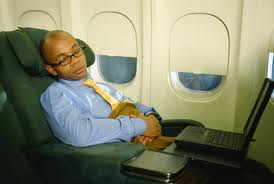The effects of long distance travel can be unpleasant: once several time zones are crossed, people are struggling to adjust to a different wake-sleep pattern, and what is know as the “circadian rhythm” has to readjust.
Eating light meals, avoiding alcohol during travel and drinking plenty of water are the suggestions, which are frequently heard. The other suggestion for travelers is adjusting their sleep times before the trip, namely going to sleep one hour earlier for each hour of time difference when traveling east. This method alone is not always practical, especially when a sudden trip with time differences of more than 8 hours are involved.
Previous research has also shown that light box therapy works and that melatonin is a useful tool in people with jet lag.
Dr. Charmane Eastman (PhD) from Rush University Medical Center has authored a study that shows that light therapy in combination with melatonin works better than light therapy alone. Dr Eastman and colleagues studied 44 healthy adults who were divided into three groups. The first group received placebo (meaning” fake” pills), the second group took 0.5 mg melatonin, and the third group received 3.0 mg melatonin. All three groups were given three days of advancing sleep-dark period with a wake time one hour earlier each morning. They also got bright light on awakening, namely four 30-minute bright-light pulses alternating with 30 minutes of room light. There were significantly larger phase advancements with 0.5 mg or 3.0 mg of melatonin, as opposed to placebo. A slightly larger shift was obtained with the 3.0 mg dose of melatonin as compared to 0.5 mg, but this difference was too small to be statistically significant.

Jetlag Helped By Bright Lights and Melatonin
The researchers concluded, that afternoon melatonin, morning intermittent bright lights and a gradually advancing sleep schedule was able to advance the circadian rhythm almost an hour a day. It was also found, that the lower dose of melatonin would be adequate, and as melatonin is pretty harmless compared to most drugs prescribed, people should not be afraid to use it (even the higher dose) to cope with jet lag.
Reference: The Medical Post, November 22, 2005, page 49
Last edited December 6, 2012





